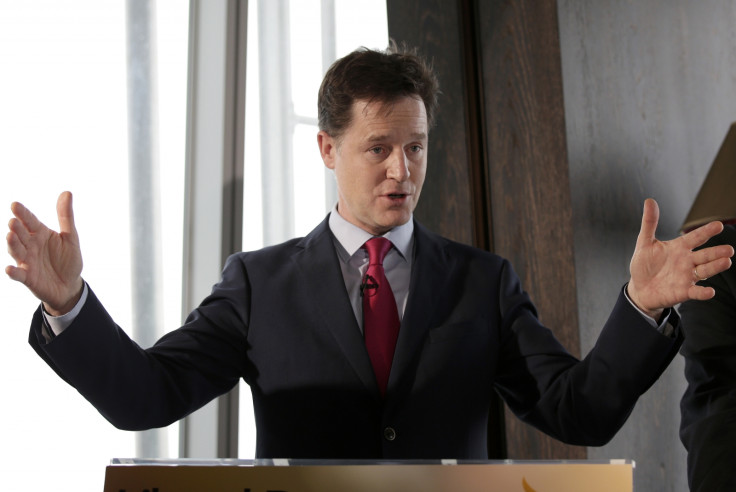General election 2015: Lib Dem's Nick Clegg warns of 'shock lurch' to left or right

Nick Clegg is pitching himself as the centre ground stalwart as we head toward the general election after he warned that the last thing Britain needs is a "shock of a lurch to the left or right".
The Liberal Democrat leader, speaking at the British Chambers of Commerce Annual Conference, claimed that only his party could keep the government in the centre ground and "ensure we secure our economic recovery, finishing the job but finishing it fairly".
"Liberal Democrats will borrow less than Labour and cut less than the Conservatives," the deputy prime minister said.
"What Britain needs right now, what businesses need right now, is stability. We must not take that for granted.
"The risk of instability is not just about what happens at home but also about the decisions we take on Europe and the world too."
He argued that the "hokey-cokey" argument over the UK's membership of the European Union (EU) is "destabilising" British business.
Clegg explained that a Liberal Democrat government would offer a referendum on the issue "if and when the rules of the game change".
"In other words, when there is a new EU treaty. But I don't believe the timing of such a momentous decision, which could potentially jeopardise millions of jobs in our country, should be determined by the domestic political needs of one party in Westminster," he added.
"Of course the EU is not perfect. We will always make the case for reform so that the EU works better for British business and British citizens.
"But we should at all times be unambiguous that Britain is better off as a member of the world's biggest borderless single market."
The Liberal Democrat leader's speech followed Ed Balls and the Prime Minister David Cameron.
The shadow chancellor, in a similar vain to Clegg, argued that the UK should not "flirt" with a "disastrous" exit from the EU as such a move would the biggest risk to Britain's economy in the next decade.
Elsewhere, Cameron sought to counter Labour's "cost of living crisis" campaign by calling on businesses to raise workers' pay.
The conference followed the publication of a poll from YouGov, commissioned by the pressure group Business for Britain.
The survey, of more than 1,000 business leaders, found that 66% of respondents explicitly backed a referendum on the UK's membership of the EU.
In contrast, only 26% of respondents were against a vote on the UK's membership of the EU.
© Copyright IBTimes 2024. All rights reserved.






